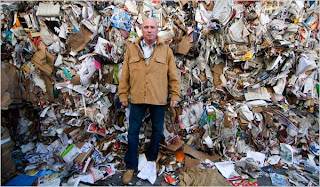
An unanticipated effect of the economic downturn: recyclables with no place to go. As the economy tanks, the demand for recyclable cardboard, plastic, and metal has fallen away. According to a front page article in yesterday’s NY Times, the market for junk has collapsed at a far more drastic rate than the stock market. On the West Coast, mixed paper that was bringing in $105 a ton in October now sells for $25. The recycler that Harvard University sends its junk to used to pay $10 a ton but now charges $20 a ton.
Our recycling system is a house of cards built on consumerism, a system that puts all its energy into the front end of the purchasing sequence. The crucial moment is when the shopper lifts the bottle of juice off the shelf and into the shopping cart. The more the bottle weighs, the fewer units will be sold. Fifty years ago, Sylan Goldman, a grocery store owner in Oklahoma, noticed his customers left the store when their hand baskets were full. To subvert this limitation, he mounted two hand baskets on a folding metal frame and thus was born the shopping cart.
Manufacturers and retailers understand the physics of consumption. The physical effort of a purchase strongly affects sales. For people in cars, drive-thru windows are easier than walking. So when it became possible to package products in inexpensive, light plastic containers, manufacturers switched. Glass bottles were ditched in favor of plastic “recyclable” containers, many of which now overfill our landfills. Business people know that maximizing consumer convenience maximizes profits. Furthermore, the life of the container after the product has been consumed has no affect on the manufacturer’s bottom line. Unless producers are required to bear the cost of recycling or storing used containers, this is a negative externality: a cost of production borne by someone else.
Interestingly, the Times article notes that demand for glass has not declined. According to Wikipedia, glass and aluminum are much easier to recycle than plastics. Both can be recycled indefinitely. Perhaps this is the moment to bring back reusable and recyclable glass and aluminum containers. They would have the dual effect of decreasing consumption—at this point in our history, a very desirable goal itself—and reducing the size of our junk heaps.
Tuesday, December 9, 2008
The Detritus of Consumption
Labels:
consumption,
recycling
Subscribe to:
Comments (Atom)
